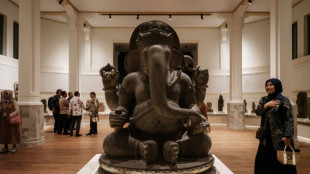
-
 Ski great Vonn finishes 14th on World Cup return
Ski great Vonn finishes 14th on World Cup return
-
Scholz visits site of deadly Christmas market attack

-
 Heavyweight foes Usyk, Fury set for titanic rematch
Heavyweight foes Usyk, Fury set for titanic rematch
-
Drone attack hits Russian city 1,000km from Ukraine frontier

-
 Former England winger Eastham dies aged 88
Former England winger Eastham dies aged 88
-
Yemen rebels strike Israel's Tel Aviv in pre-dawn missile attack

-
 Germany in shock after new deadly Christmas market attack
Germany in shock after new deadly Christmas market attack
-
Pakistan Taliban claim raid killing 16 soldiers

-
 Pakistan military courts convict 25 of pro-Khan unrest
Pakistan military courts convict 25 of pro-Khan unrest
-
16 wounded after Israel hit by missile fired from Yemen

-
 US Congress passes bill to avert shutdown
US Congress passes bill to avert shutdown
-
Sierra Leone student tackles toxic air pollution

-
 German leader to visit site of deadly Christmas market attack
German leader to visit site of deadly Christmas market attack
-
16 injured after Israel hit by Yemen-launched 'projectile'

-
 Google counters bid by US to force sale of Chrome
Google counters bid by US to force sale of Chrome
-
Russia says Kursk strike kills 5 after Moscow claims deadly Kyiv attack

-
 Cavaliers cruise past Bucks, Embiid shines in Sixers win
Cavaliers cruise past Bucks, Embiid shines in Sixers win
-
US President Biden authorizes $571 million in military aid to Taiwan

-
 Arahmaiani: the Indonesian artist with a thousand lives
Arahmaiani: the Indonesian artist with a thousand lives
-
Amazon says US strike caused 'no disruptions'

-
 Indonesians embrace return of plundered treasure from the Dutch
Indonesians embrace return of plundered treasure from the Dutch
-
Qualcomm scores key win in licensing dispute with Arm

-
 Scientists observe 'negative time' in quantum experiments
Scientists observe 'negative time' in quantum experiments
-
US approves first drug treatment for sleep apnea

-
 US drops bounty for Syria's new leader after Damascus meeting
US drops bounty for Syria's new leader after Damascus meeting
-
Saudi man arrested after deadly car attack on German Christmas market

-
 'Torn from my side': horror of German Christmas market attack
'Torn from my side': horror of German Christmas market attack
-
US House passes bill to avert shutdown, Senate vote to follow

-
 Bayern Munich rout Leipzig on sombre night in Germany
Bayern Munich rout Leipzig on sombre night in Germany
-
Tiger in family golf event but has 'long way' before PGA return

-
 Wall Street climbs as markets brace for possible govt shutdown
Wall Street climbs as markets brace for possible govt shutdown
-
Pogba wants to 'turn page' after brother sentenced in extortion case

-
 Court rules against El Salvador in controversial abortion case
Court rules against El Salvador in controversial abortion case
-
Reggaeton star Daddy Yankee, wife resolve business dispute

-
 French court hands down heavy sentences in teacher beheading trial
French court hands down heavy sentences in teacher beheading trial
-
Israel army says troops shot Syrian protester in leg

-
 Tien sets-up all-American NextGen semi-final duel
Tien sets-up all-American NextGen semi-final duel
-
Bulked-up Fury promises 'war' in Usyk rematch

-
 Major reshuffle as Trudeau faces party pressure, Trump taunts
Major reshuffle as Trudeau faces party pressure, Trump taunts
-
Reggaeton star Daddy Yankee in court, says wife embezzled $100 mn

-
 Injured Eze out of Palace's clash with Arsenal
Injured Eze out of Palace's clash with Arsenal
-
Norway's Deila named coach of MLS Atlanta United

-
 In Damascus meeting, US drops reward for arrest of Syria's new leader
In Damascus meeting, US drops reward for arrest of Syria's new leader
-
Inter-American Court rules Colombia drilling violated native rights

-
 Amazon expects no disruptions as US strike goes into 2nd day
Amazon expects no disruptions as US strike goes into 2nd day
-
Man Utd 'more in control' under Amorim says Iraola

-
 Emery insists Guardiola 'still the best' despite Man City slump
Emery insists Guardiola 'still the best' despite Man City slump
-
US confirms billions in chips funds to Samsung, Texas Instruments

-
 English Rugby Football Union chairman quits amid pay row
English Rugby Football Union chairman quits amid pay row
-
Wall Street rebounds despite US inflation ticking higher


Your 'local everything': what 7-Eleven buyout battle means for Japan
In Japan more is at stake than money in the mammoth takeover battle for 7-Eleven, the world's biggest convenience chain, by Canadian retail giant Alimentation Couche-Tard.
It is a litmus test for government efforts to shake up corporate Japan, experts say, and one that may put more firms in the sights of foreign buyers.
The chain is a ubiquitous lifeline for an ageing population in Japan and a cherished one-stop shop for everything from egg sandwiches to concert tickets.
For tourists it's Instagram gold, sparking jokes about spending $1,000 on flights just to eat a $1 rice ball.
"It's part of the fabric of Japan, the infrastructure," Gavin H. Whitelaw, a researcher at Harvard who has worked at three Japanese convenience stores, told AFP.
"They've become a kind of global template for convenience retail" as "the equivalent of a 'local everything'", said Whitelaw, executive director of the Reischauer Institute of Japanese Studies.
As well as stocking up on fresh food, toiletries and snacks, 7-Eleven customers in Japan can pay bills, print photos and send suitcases across the country, or just use the ATM.
To operate smoothly, Japanese convenience stores have mastered a "byzantine-like distribution system" and crunch huge amounts of data on consumer behaviour, Whitelaw said.
"There's national pride to this," with the stores nicknamed "konbini" often acting as community hubs that contribute to local festivals and help in disasters, he added.
- Ito's idea -
7-Eleven began life in the United States but late billionaire Masatoshi Ito turned it into a Japanese empire with 85,000 stores worldwide, a quarter of them in Japan.
Last month its owner Seven & i -- Japan's biggest retailer -- rejected a $40-billion offer from ACT, saying it undervalued the company, while warning of regulatory hurdles.
But the Canadian group, which owns Circle K and runs nearly 17,000 outlets worldwide, has vowed to pursue what would be the biggest foreign takeover of a Japanese firm.
Seven & i shares surged on Wednesday after Bloomberg News reported that ACT had upgraded its offer to around $47 billion.
The group declined to comment, but Seven & i's CEO is due to speak on Thursday when second-quarter earnings are released.
"The timing of Couche-Tard's bid cannot be more perfect," said Kai Li, a professor and Canadian corporate governance expert at the UBC Sauder School of Business.
Japanese companies are "relatively cheap" thanks to the weak yen, she said, while the country also revised its merger and acquisition guidelines last year.
The new rules aim to make Japan's business world more competitive by discouraging companies from routinely dismissing foreign buyout offers.
- 'Core' industry -
In 2021, Couche-Tard dropped a takeover bid worth 16 billion euros ($17 billion today) for French supermarket Carrefour after Paris said it would veto the deal over food security concerns.
It's unclear if Japan's new government under Prime Minister Shigeru Ishiba would do the same, but last month, the finance ministry designated Seven & i a "core" industry.
The move gives authorities more power to block a takeover in certain cases.
Recent media reports have also said Seven & i wants to strengthen its hand by selling off other assets such as its banking unit.
Japanese companies were once famous for their huge global acquisitions -- but they have long spurned the idea of foreign buyouts the other way around.
"Traditionally speaking, companies were very stable" in Japan and considered mergers "a very, very foreign concept", said Nobuko Kobayashi from consulting firm EY.
"It's the end of your sort of business history if you sell out. So it had a bad connotation," she told AFP.
This is changing, however, as authorities and businesses try to drag Japan's economy out of stagnation, so the 7-Eleven buyout tussle is being closely watched -- with some saying it could unleash many similar deals.
The weak yen, Japanese companies being undervalued in the stock market, and China's economic woes and geopolitical risks making it less attractive to buyers mean "all eyes are on Japan", Kobayashi said.
However, prospective buyers should be wary that it can be difficult to enact a "transformation" within Japan's rigid management style, she said.
"You may need kind of a structural change in mindset to unlock the value of Japan."
M.Ouellet--BTB
